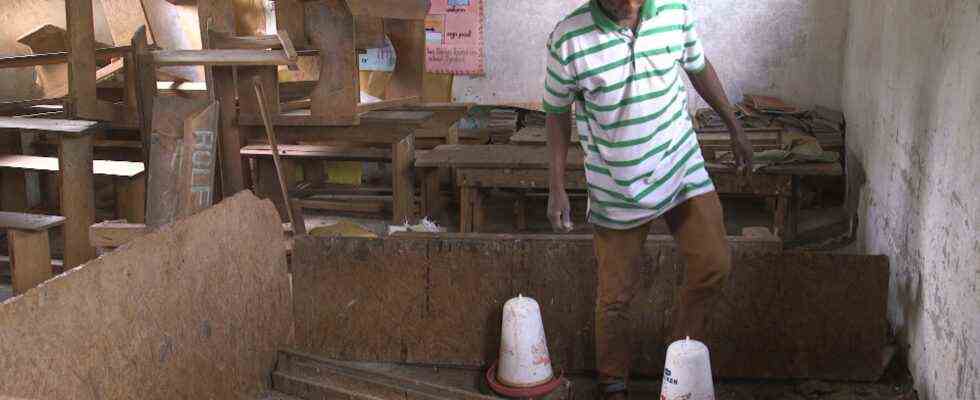Status: 07.10.2021 4:05 a.m.
Uganda’s schools are closed – and have been since the pandemic began. Because there is hardly any vaccine available, lessons can only take place in secret – and more and more teachers are giving up.
They sit quietly on long benches in a kind of barn and watch spellbound as Thomas Ssebiranda’s chalk leaves marks on the blackboard: Two dozen children who are following a math lesson that is actually not supposed to be given. Because Uganda’s government has still not lifted the school closings, which have been in effect almost continuously since the beginning of the corona pandemic. “We always hoped for it,” says teacher Ssebiranda. “Now we’re hoping for January. But we don’t know whether that will happen either.”
The 42-year-old is actually the head of the “Bright Future Primary School” in Mairikiti, 50 kilometers south of the capital Kampala. But the bright future, after which his school is named, has faded since Corona: In one of the classrooms that Ssebiranda shows us, tables and benches made of roughly planed wood are stacked. In front of this, chipboard is fencing off a henhouse – somehow everyone has to survive.
Thomas Ssebiranda now teaches two dozen students in an old barn – the now closed school would have 421 children and young people.
Image: ARD Studio Nairobi
Teacher drifted into crime
“Before Covid we had 421 children, from kindergarten to the last grade of elementary school,” says Ssebiranda. He taught 55 children in one class, earning the equivalent of around 100 US dollars a month. Those weren’t times that could really be called good either. But with the closure of the small, modest private school, the earnings fell completely – many parents temporarily earned nothing and would not have been able to pay anyway.
Instead of being taught in the school building, the students are now taught in a kind of barn.
Image: ARD Studio Nairobi
The state schools continue to pay, but usually less than the private ones. Frustration runs deep among the country’s many private teachers in particular: “Most of them will probably give up their jobs,” fears Ssebiranda. “Teachers are not considered important here. They can’t make ends meet. It’s not even enough for medical care.”
Some become market vendors or open small shops, he says. He also knows someone who has drifted into crime out of sheer need. But Ssebiranda sees his job as a task. He teaches about 20 children here. The parents pay the equivalent of 1.20 euros for their child per week for instruction in the small shed: “We hide here. The walls are not plastered, the floor is made of earth,” says Ssebiranda and continues to write his math problems to the Blackboard, with Roman and Arabic numerals.
Little time for lessons
But not only the teachers suffer, but of course the students too. Mariam Kawala is happy to have lessons at all. But that’s about it: “I used to take classes with my friends, and I could ask them if I didn’t know something,” she says quietly. There is little time for lessons now. A lot of time goes by at home, where she now has to help more.
Mariam Kawala says she doesn’t have much time left to study – but one goal: to become a nurse.
Image: ARD Studio Nairobi
The state now prefers to have teachers vaccinated – but the vaccine is never enough. A few hundred thousand cans have been donated from abroad, but that’s not enough. The World Health Organization (WHO) assumes that Africa will miss its already modest target for this year by a whole quarter. In the USA alone, 15 million expired vaccine doses have been thrown away since March – enough to completely vaccinate the population in three African countries, as the WHO recently warned.
The fact that vaccination skepticism is great in some African countries – including parts of Uganda – does not make the problem any less. In any case, Ssebiranda wants to be vaccinated. And: He does not complain about the rich abroad, where booster vaccinations have been talked about for a long time, but about his own government, which should do more, as he thinks.
“Our friends, our teachers – I miss them all very much,” says student Mariam. And yet, in the middle of her own drama, the 13-year-old already sees a role for herself: “I’m good at science,” she says. “I want to be a nurse, I want to help others.”

